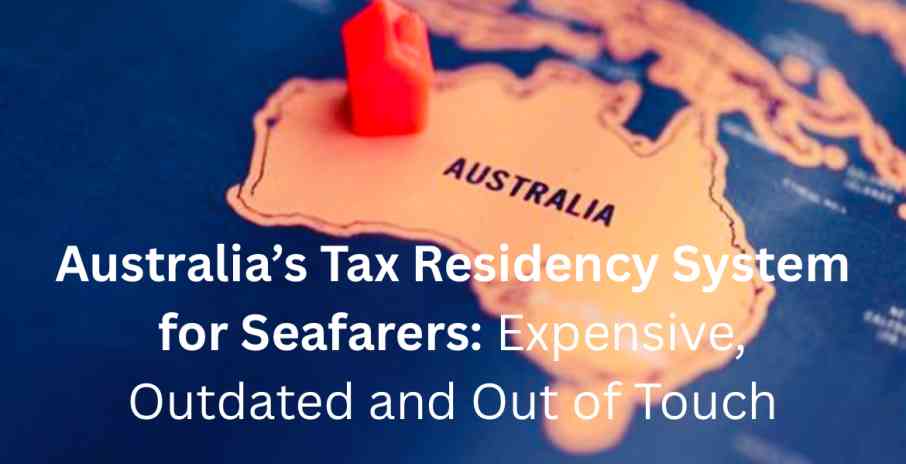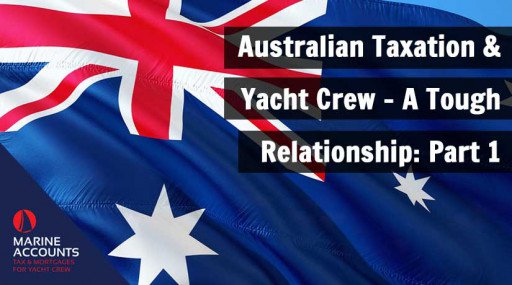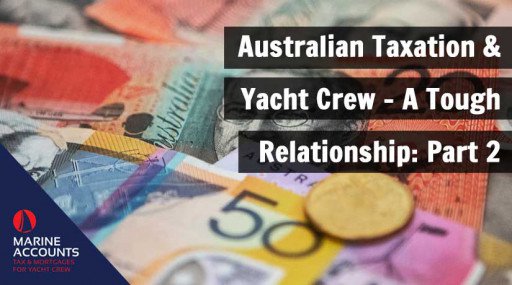Australia’s Tax Residency System for Seafarers: Expensive, Outdated, and Out of Touch
- Authors
-
-

- Name
- Patrick Maflin
-


For professional seafarers, the concept of home is fluid. With contracts spanning international waters and time spent across multiple jurisdictions, determining tax residency can be a complex but critical matter. Unfortunately, for those connected to Australia, seeking clarity through the Australian Taxation Office (ATO) is anything but straightforward. In fact, it’s an expensive, bureaucratic, and deeply antiquated process that leaves many seafarers in a legal and financial grey area.
Residency Rulings: A Pricey Path to Certainty
Seafarers hoping to confirm their non-residency or clarify their tax position often turn to a Private Binding Ruling (PBR) from the ATO. This ruling can offer much-needed peace of mind, but at a high cost. While the ATO doesn’t charge a fee to issue a ruling, the complexity of the process effectively forces individuals to seek legal or tax representation, with associated costs running into thousands of dollars.
For those working offshore under tight contracts, this is an unfair burden. Worse, it penalises those trying to do the right thing by proactively engaging with the tax system. The reality is that most seafarers just want clarity and compliance without being buried in red tape.
An Archaic Approach in a Modern Industry
The ATO’s reliance on outdated tests, such as the “domicile” and “183-day” rules, does not reflect the unique working lives of seafarers. These tests fail to consider the offshore nature of marine employment, the contractual obligations that dictate time at sea, or the global nature of the maritime industry.
Even when individuals spend most of the year outside Australian waters, they are often caught up in vague interpretations of “intention to reside” or “ordinary patterns of living.” These subjective judgments open the door to uncertainty, audit risk, and inconsistent outcomes.
Why Has the ATO Not Acted?
Back in July 2018, The Sydney Morning Herald warned that Australia’s outdated residency rules needed urgent reform, noting they were largely unchanged since their introduction in 1930. The Board of Taxation’s subsequent review echoed that concern, stating the rules “do not meet the objectives of simplicity, efficiency, equity and integrity” and should be modernised “as a matter of priority.”
Draft legislation appeared in 2019 and resurfaced in the May 2021 Federal Budget, proposing an objective, time-based framework that included a simple 183-day “bright-line” rule and a stricter 45-day secondary threshold for returning residents. Treasury followed up with a consultation paper in mid-2023, yet no bill has reached Parliament, and the 2025–26 Budget offered no timeline for progress. In the interim, the ATO consolidated its position in TR 2023/1, explicitly acknowledging that legislative reform “has not progressed.”
Professional bodies, including Chartered Accountants ANZ and the Institute of Public Accountants, continue to lobby for change, warning that prolonged uncertainty leaves globally mobile Australians, particularly seafarers, navigating an overly complex, discretionary regime while they await a clear, modern set of rules.
A Stark Contrast: New Zealand’s Progressive Model
In stark contrast, New Zealand offers a clear, structured, and far more modern approach to tax residency. Its rules are defined, time-based, and considerate of international mobility. Most importantly, the New Zealand Inland Revenue Department provides clear guidance for those working offshore, including seafarers, with practical examples and accessible language.
Residency decisions are transparent and generally do not require the individual to jump through bureaucratic hoops or engage in costly private rulings. As a result, seafarers connected to New Zealand have a far easier time determining their obligations and planning their affairs with certainty.
A Call for Reform
Australia urgently needs to modernise its tax residency framework, particularly for globally mobile professionals such as seafarers. Clearer legislation, streamlined processes, and affordable access to certainty must become a priority. Reform should include a fixed-fee, simplified ruling system, digitised processing, and updated residency criteria that align with the realities of international maritime employment.
The longer Australia clings to outdated processes, the more it risks losing credibility among global workers and alienating the very professionals it should be supporting. Seafarers deserve a system that works with them, not against them.
Need Guidance?
If you’re unsure about your tax residency status or need advice on how Australia’s tax rules apply to your offshore employment, we’re here to help. Our team offers tailored tax consultations specifically for seafarers and internationally mobile professionals. Get in touch today to book a confidential consultation.






